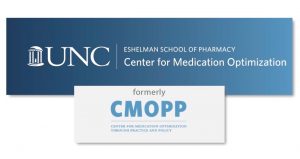Author: Amber Bivins Ray
Welcome back students! We are very excited to interact with those of you both new and old. My name is Amber and I recently joined the Center for Medication Optimization (CMO) as the inaugural Health Policy Fellow. I joined the CMO team because I believe in the importance of evidence-based decision making and the benefits of pharmacists being integral members in team-based care. One of our goals at CMO is to advance pharmacy practice by shaping health policy. So, in this role, I hope to help establish CMO as the go-to resource on appropriate medication use, with the aim of informing health care decision making.
Thus far, I have been truly inspired by the dedication of the staff and mission-driven work accomplished by CMO. I have learned that in this fast-moving environment, we are committed to the continuous improvement of our performance and amplification of our impact. In accordance, those of you familiar with the Center might have noticed our recent NAME and LOGO CHANGE! In the spirit of sharpening our name to better reflect our work, and as the newest member of the team, I thought I would take some time to explore what medication optimization means to the students who are newly back from break!
We heard from students of all years about their thoughts on medication optimization, the role pharmacists can play, and challenges in health care. One very intuitive student knocking on the door of graduation already has it all figured out. Medication optimization is the process of “making sure that a patient has the right drug at the right dose at the right time for all of their medications,” says Chelsea Sumner, fourth year PharmD candidate. To Sumner, medication optimization in the future will be an important health care strategy used to reduce health care costs and improve health outcomes as medications become more advanced and people need more help in managing their disease states. “Pharmacists will play a vital role in decreasing the burden of physicians,” she says. However, even when patients receive fully optimized medication regimens, there may be other barriers precluding them from experiencing the full benefits of their treatments. “You can’t have health improvement without adherence and majority of patients today worry about the cost of their medication,” Sumner proclaims as she describes a time when she dealt with a patient who lost her pharmacy assistance due to a $1 increase in pay from her job. “No one should have to choose between their job and their health,” she says.
Along these same lines, third-year student Raena Rhone characterizes medication optimization as helping patients receive the most effective, affordable, and safe medications. “Health care decision-makers are becoming more invested in ensuring that patients are receiving the greatest value from the medications they are prescribed,” she said, and hopes that in the future we will be able to more routinely integrate patient specific characteristics, like genetics, into medication optimization strategies. Another third-year pharmacy student, Ember Lu, emphasized health literacy as a critical component of medication optimization, believing that a patients’ own understanding of his or her medications is crucial in achieving maximum adherence.
When asked about the biggest challenges related to cost facing health care today, one ambitious third year student stated that a lack of collaboration between health care providers is a big issue that can lead to unnecessary errors and hospital readmissions. “We need a unified voice that has a defined set of changes that we need before any change will occur,” he said when describing how pharmacists could help fill these gaps and enhance collaboration if certain regulatory shackles were removed. Another fourth-year student cosigned this sentiment of wanting more coordinated advocacy in pharmacy to promote pharmacists in team-based care. The Center for Medication Optimization provides ample ways for students to engage with the team to learn about topics of interest, like advocacy, she added. Through engagement with students through the Research and Scholars in Pharmacy (RASP) pathway, the CMO summer internship, and topic discussions at CMO Round Table Wednesdays, students have opportunities to learn more about pharmacists in team-based care.
To us at CMO, medication optimization is a patient-centered, collaborative approach to managing medications that is applied consistently across care settings. It involves maximizing the benefits of medications to meet quality and cost goals. Health care payers are now shifting towards paying for value, providing new opportunities to integrate medication optimization services into new health care payment and delivery models. At the CMO we work collaboratively towards generating evidence that demonstrates the value that focusing on the appropriate use of medications can have not only in reducing costs in the long run, but most importantly, improving patient health and quality of life. The ultimate goal is to revolutionize pharmacy practice through research, health policy, and education. To this end, at CMO we also work towards preparing the next generation of pharmacists for the new health care landscape they are likely to encounter. The results from the savvy students surveyed show us that our students are already aware of the challenges facing our health care system today and the vital role that pharmacists can and should play in helping solve these challenges; we just need to give them the tools to do so.
Our name has changed, but our mission has not. We will continue to conduct impactful real-world research, generate evidence, disseminate best practices and advance education. Through simple communication on this blog we aim to keep you informed of our projects, publications, pharmacy hot topics, and other issues that affect you. We encourage you to interact with the team by downloading our resources, following us on Twitter, and leaving comments. Through our collective voices, we will transform healthcare together!
Amber Bivins Ray
Health Policy Fellow
Center for Medication Optimization


